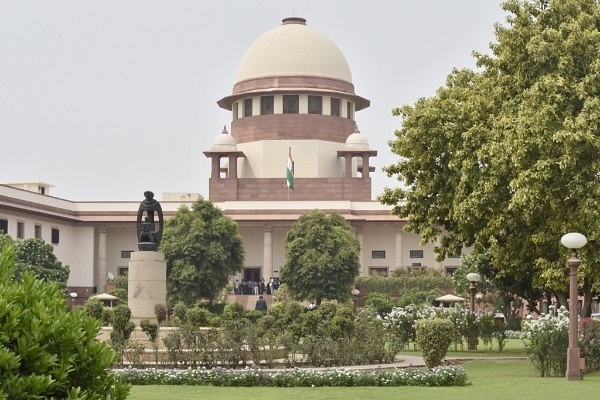Insta
President Ram Nath Kovind Appoints Four Different HC Chief Justices As The Judges Of The Supreme Court

Supreme Court of India (Sonu Mehta/Hindustan Times via Getty Images)
Four different High Court Chief Justices were appointed as judges of the Supreme Court, taking the judge strength of the apex court to 34, the highest ever.
The oath ceremony is likely to take place next Monday. The four new judges of the top court are Himachal Pradesh Chief Justice V. Ramasubramanian, Punjab and Haryana Chief Justice Krishna Murari, Rajasthan Chief Justice S.A. Ravindra Bhat and Kerala Chief Justice Hrishikesh Roy.
The central government has cleared their appointment as Supreme Court judges and President Ram Nath Kovind has appointed them as judges of the top court.
The Supreme Court collegium last month recommended the Centre to elevate four Chief Justices of different high courts to the apex court.
The collegium has said against the sanctioned judge strength of 34, the Supreme Court is currently functioning with 30 judges, leaving four vacancies.
While recommending the names of Justice Krishna Murari, Justice S. Ravindra Bhat, Justice V. Ramasubramanian, and Justice Hrishikesh Roy, the collegium has taken into consideration combined seniority on all-India basis of Chief Justices and senior puisne Judges of High Courts, apart from their competence, conduct and integrity.
Justice Ramasubramanian, born on 30 June 1958, did his Bachelor's in science from Vivekananda College in Chennai and Law from the Madras Law College, before enrolling as a member of the bar on 16 February 1983.
After practising for almost 23 years in the Madras High Court, he was appointed Additional Judge of the Madras High Court on 31 July 2006 and as a permanent Judge on 9 November 2009.
He was transferred at his own request to the High Court of Judicature at Hyderabad for Telangana and Andhra Pradesh with effect from 27 April 2016. After the bifurcation and the creation of a separate High Court for Andhra Pradesh, he was retained as a Judge of the High Court of Telangana at Hyderabad with effect from 1 January 2019.
He was sworn in as the Chief Justice of Himachal Pradesh High Court on 22 June 2019.
Justice Murari, born on July 9, 1958, did his law degree from the Allahabad University, and was enrolled as an advocate on 23 December 1981.
Practising in the Allahabad High Court for over 22 years in civil, constitutional, company, service and revenue matters and specialising in civil revenue and service cases, he was Standing Counsel of Uttar Pradesh State Yarn Co Ltd, Kanpur, Northern Railway Primary Co-operative Bank Ltd, UP State Textile Corporation Ltd, Kanpur, UP Co-operative Spinning Mills Federation Ltd, Kanpur and Bundelkhand University, Jhansi.
Appointed as an Additional Judge of the Allahabad High Court on 7 January 2004 and appointed a permanent Judge on 18 August 2005, he took over as Chief Justice of Punjab at Haryana High Court on 2 June 2018.
Justice Bhat, born in 1958, graduated in law from Campus Law Centre of the Delhi University and enrolled with the Delhi Bar Council the same year.
After practising before the Delhi High Court and the Supreme Court, he was appointed an Additional Judge of the Delhi High Court in 2004 and a permanent Judge in 2006.
He was appointed Chief Justice of the Rajasthan High Court on 5 May 2019.
Justice Hrishikesh Roy was sworn-in as the 35th Chief Justice of the Kerala High Court on 8 August 2018 after being its Acting Chief Justice since 30 May 2018, on his transfer from the Gauhati High Court.
Born on 1 February 1960, he did his LL.B from Campus Law Centre of the Delhi University in 1982. He practiced in the Gauhati High Court and was designated as a senior advocate on 21 December 2004.
Sworn in as an Additional Judge of Gauhati High Court on 12 October 2006, he was made a permanent judge with effect from 15 July 2008.
As the executive head of the Assam State Legal Services Authority, Justice Roy had implemented the "Reach Out & Respond" programme to facilitate access to justice for the marginalised sections of the state. He was also in-charge of the Assam chapter of the Indian Law Institute.
Spearheading the training programmes for the Judicial Officers under the Gauhati High Court, he was nominated as a member of the National Judicial Academic Council, headed by the Chief Justice of India.
While he headed the Mediation Monitoring Committee, the film "Shako" (Bridge) was produced and is used as a training tool in mediation programmes. The Arunachal Pradesh Legal Services Authority, led by Justice Roy, produced 'Apne Ajnabi', a short film on racial discrimination which highlights how legal help can be provided to the victims.
(This story has been published from a wire agency feed without modifications to the text. Only the headline has been changed.)
Introducing ElectionsHQ + 50 Ground Reports Project
The 2024 elections might seem easy to guess, but there are some important questions that shouldn't be missed.
Do freebies still sway voters? Do people prioritise infrastructure when voting? How will Punjab vote?
The answers to these questions provide great insights into where we, as a country, are headed in the years to come.
Swarajya is starting a project with an aim to do 50 solid ground stories and a smart commentary service on WhatsApp, a one-of-a-kind. We'd love your support during this election season.
Click below to contribute.
Latest